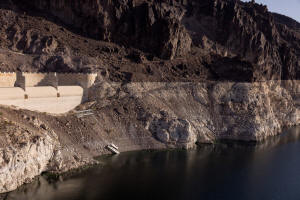U.S. states struggle to share dwindling waters of Colorado River
 Send a link to a friend
Send a link to a friend
 [February 01, 2023]
SEATTLE, Wash. (Reuters) - The Colorado River, which
provides drinking water to 40 million people in seven U.S. states, is
drying up, straining a water distribution pact amid the worst drought in
12 centuries, exacerbated by climate change. [February 01, 2023]
SEATTLE, Wash. (Reuters) - The Colorado River, which
provides drinking water to 40 million people in seven U.S. states, is
drying up, straining a water distribution pact amid the worst drought in
12 centuries, exacerbated by climate change.
California split from the six states of Arizona, Colorado, Nevada, New
Mexico, Utah and Wyoming on Tuesday in the face of a U.S. government
deadline to negotiate their own supply cuts or face possible mandatory
cutbacks by the federal government.
"What happened today was a step forward," said Kevin Moran, a water
policy specialist at the Environmental Defense Fund.
"Six of the seven basin states are playing catch-up to reduce water use
from the Colorado River, which is absolutely critically needed after 20
years of drought and the impacts of climate change," Moran told Reuters.
When the states struck their agreement 100 years ago, it envisaged the
river could provide 20 million acre-feet of water a year. An acre-foot
(1,233 cubic meters) of water is generally considered enough to supply
two urban households per year.
But over the last two decades, the actual flow has dwindled to 12.5
million acre-feet on average, leaving state water managers with more
rights on paper than existing supply.

California receives the largest allotment, 80% of which is consumed by
its $50-billion agricultural industry.
Many experts see its decision to sit out the agreement as fuelling the
chances that the water fight will end up in the nation's highest courts.
"We have a situation where some of the water rights holders in
California are saying, 'We're not willing to give up more water, and we
think we have legal rights and we're willing to go to court if we have
to'," said David Hayes, a lecturer at Stanford University Law School.
"And there's not enough time to litigate these issues," added Hayes, a
former top climate aide to President Joe Biden.
[to top of second column]
|

A dry spillway at Hoover Dam, and stairs
ending on a cliff are seen next to the growing ring around Lake
Mead, where water levels have declined dramatically to lows not seen
since the reservoir was filled after the construction of Hoover Dam,
as climate change and growing demand for its water shrink the
Colorado River and create challenges, in Boulder City, Nevada, U.S.,
April 17, 2022

He saw a need for drastic conservation efforts to protect reservoirs
from overuse and drought worsened by climate change, a situation
that if left unchecked could threaten supply from the Hoover Dam to
the city of Las Vegas or California.
Although California was deluged for weeks from late in December by
seven atmospheric rivers that dumped up to 30 inches (76 cm) of rain
over some areas, little of that reached the Colorado River basin.
Despite predictions for more such atmospheric rivers, of growing
size and frequency, California cannot solve its long-term crisis
without major investments to capture more storm water, restore flood
plains and recycle wastewater.
A report in the journal Nature last year found 2000-2021 to be the
driest 22-year period for southwestern North America in at least
1,200 years.
"Something will have to give," said Sharon Megdal, director of the
University of Arizona's Water Resources Research Center,
as temperatures rise, mountain snows melt faster in spring, and the
state lacks capacity to store the runoff.
A letter signed by the six states showed they all recognised the
need for a change in operating procedures for the Colorado River and
deliveries from it, she added.
"I think people would like to believe that we can somehow figure out
a way to keep these economic activities, keep our kind of economies
and livelihoods, going," Megdal said.
"But it's going to be a drier future."
(Reporting by Liliana Salgado and Temis Tormo; Writing by Clarence
Fernandez; Editing by Nick Macfie)
[© 2023 Thomson Reuters. All rights
reserved.]This material may not be published,
broadcast, rewritten or redistributed.
Thompson Reuters is solely responsible for this content. |